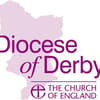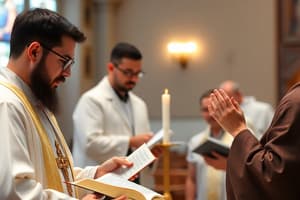Podcast
Questions and Answers
What is the purpose of the Responsorial Psalm in the Liturgy of the Word?
What is the purpose of the Responsorial Psalm in the Liturgy of the Word?
- To provide a break between readings
- To lead the congregation in prayer
- To introduce the Gospel reading
- To help the faithful meditate on the Word of God (correct)
Which part of the Liturgy of the Word is a reflection on the Scripture readings?
Which part of the Liturgy of the Word is a reflection on the Scripture readings?
- First Reading
- Gospel Reading
- Responsorial Psalm
- Homily (correct)
Where is the Gospel Reading taken from in the Liturgy of the Word?
Where is the Gospel Reading taken from in the Liturgy of the Word?
- Old Testament
- Book of Psalms
- New Testament books (correct)
- Book of Prophets
What follows the Homily in the Liturgy of the Word?
What follows the Homily in the Liturgy of the Word?
Which reading is usually taken from the Old Testament in the Liturgy of the Word?
Which reading is usually taken from the Old Testament in the Liturgy of the Word?
What is the high point of the Liturgy of the Word?
What is the high point of the Liturgy of the Word?
What is the main responsibility of the lector in the Liturgy of the Word?
What is the main responsibility of the lector in the Liturgy of the Word?
Why is the Liturgy of the Word important in Christian worship?
Why is the Liturgy of the Word important in Christian worship?
What does the Liturgy of the Word help to pass on from one generation to the next?
What does the Liturgy of the Word help to pass on from one generation to the next?
What does the text describe as one of the reasons for the importance of the Liturgy of the Word?
What does the text describe as one of the reasons for the importance of the Liturgy of the Word?
What makes the faithful become living witnesses of Christ's message according to the text?
What makes the faithful become living witnesses of Christ's message according to the text?
How does the text describe the Liturgy of the Word?
How does the text describe the Liturgy of the Word?
What does the Liturgy of the Word help to establish among the faithful, according to the text?
What does the Liturgy of the Word help to establish among the faithful, according to the text?
What does participating in the Liturgy of the Word provide for the faithful?
What does participating in the Liturgy of the Word provide for the faithful?
What is described as a task that may be taken on by a lector in addition to proclaiming the readings?
What is described as a task that may be taken on by a lector in addition to proclaiming the readings?
Flashcards are hidden until you start studying
Study Notes
Liturgy of the Word: The Proclamation of God's Message
The Liturgy of the Word is a crucial part of Christian worship, as it is the moment when the Word of God is proclaimed, bringing spiritual nourishment and enlightenment to the faithful. This article will explore the structure and components of the Liturgy of the Word, the role of the lector in this liturgy, and the importance of the Liturgy of the Word in Christian worship.
Structure and Components of the Liturgy of the Word
The Liturgy of the Word is made up of several components, which include:
- First Reading: Usually from the Old Testament, this reading is the first part of the Liturgy of the Word.
- Responsorial Psalm: Sung between the readings, the psalm helps the faithful meditate on the Word of God.
- Second Reading: Taken from one of the New Testament books, this reading is the second part of the Liturgy of the Word.
- Gospel Reading: The high point of the Liturgy of the Word, this reading is taken from one of the four Gospels and tells of the life, ministry, and preaching of Christ.
- Homily: A reflection by the celebrant or other ministers on the Scripture readings, which helps the faithful understand and apply the message to their lives.
- Profession of Faith: Either the Nicene or Apostles' Creed, this statement of belief follows the homily and is recited by the faithful.
- Universal Prayer (Prayer of the Faithful): A prayer for the needs of the whole Church, the world, and the faithful, which follows the Profession of Faith.
Role of the Lector in the Liturgy of the Word
The lector plays a vital role in the Liturgy of the Word, as they are responsible for proclaiming the readings from the Bible. The lector's task is to speak clearly and with understanding, ensuring that the Word of God is effectively communicated to the faithful. In some cases, the lector may also be responsible for leading the responsorial psalm and announcing the Gospel reading.
Importance of the Liturgy of the Word in Christian Worship
The Liturgy of the Word holds great importance in Christian worship for several reasons:
- Encountering God's Word: Through the readings from the Bible, the faithful have the opportunity to hear God speaking to them, receiving spiritual nourishment, and experiencing the mystery of redemption and salvation.
- Unity and Communication: The Liturgy of the Word brings the faithful together as one, establishing communion and preparing them to listen to the Word of God and celebrate the Eucharist.
- Living Witnesses: By proclaiming the Word of God, the faithful become living witnesses of Christ's message, spreading the Gospel throughout the world.
- Transmission of Faith: The Liturgy of the Word helps to pass on the faith from one generation to the next, ensuring the continuity of the Christian tradition.
In conclusion, the Liturgy of the Word is a central and essential part of Christian worship, providing the faithful with the opportunity to encounter God's Word, grow in their faith, and share the Gospel with others. By participating in this liturgy, the faithful are able to experience the transformative power of God's Word and strengthen their relationship with Him.
Studying That Suits You
Use AI to generate personalized quizzes and flashcards to suit your learning preferences.






